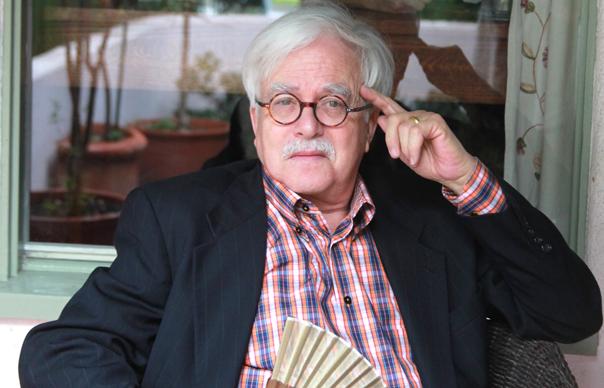The pint-sized Pope of pop candy coats his protest songs... In 1967, aged only 24, Van Dyke Parks came to the pop world’s attention with two glorious failures. He co-wrote Brian Wilson’s aborted orchestral pop masterwork SMiLE, then followed it with his own symphonic voyage across America ent...
The pint-sized Pope of pop candy coats his protest songs…
In 1967, aged only 24, Van Dyke Parks came to the pop world’s attention with two glorious failures. He co-wrote Brian Wilson’s aborted orchestral pop masterwork SMiLE, then followed it with his own symphonic voyage across America entitled Song Cycle. Both were highbrow epics that helped take pop music into the conservatoire: few rock ‘n’ roll bands would ever have considered writing the Joycean poetry of “the pit and the pendulum drawn/columnated ruins domino” (as Parks did in “Surf’s Up”); even fewer would have the chops to write the kind of densely orchestrated arrangements that referenced Aaron Copland’s Wild West symphonies, Schumann lieder, Tin Pan Alley standards and the fractured folksong of the entire American continent. As Parks himself says, he’s spent nigh on half a century counteracting charges that he was rather too clever for his own good. “The rock critics would slop words like ‘obscurantism’ and ‘obfuscation’ on me,” he snorts, gleefully. “They’ve always wanted opacity.”
Songs Cycled, his first proper solo album in 24 years, is an opaque and entirely accessible album. All 12 of its tracks would make sense to your parents, grandparents or children; all could be easily smuggled onto the Radio 2 playlist; few would sound out of place on any of the Disney soundtracks that Parks has worked on since The Jungle Book. But, the more you snuggle up inside Parks’s wonderfully upholstered orchestrations, the more you realise that this MOR sheen hides an audacious, subversive and politically trenchant agenda.
Only four of these tracks are entirely new compositions, where agit-prop sentiments are sweetened by exquisite, chirruping arrangements. The opener, “Dreaming Of Paris” draws connections between the US invasions of Vietnam and Iraq, but manages to do so within the boundaries of a woozy, hopelessly romantic tango. “Black Gold” is Sondheim-ish account of the “ecologic nightmare” created by a doomed oil tanker. “Wall Street” is a pretty, Disneyfied duet with Inara George which turns out to be a dark meditation on 9/11. And “Missin’ Missippi” is a gentrified Cajun-style duet with Gaby Moreno that pays homage to VDP’s native state in the wake of Hurricane Katrina.
For Parks, “a good arrangement transcends the mathematics of melody”, and all the remaining tracks are radical rearrangements of his old material, or traditional songs that complement the originals. On 1967’s Song Cycle “All Golden” was a bafflingly complex score for strings, brass and harp: on this new version, Parks’s voice is backed only by rippling piano and simple accordion, and the song benefits hugely. “Hold Back Time”, a herky-jerky country grunter first croaked out by Brian Wilson on the 1995 album Orange Crate Art, is transformed into an elegant tango, with a nimble, swooping arrangement for strings, ukuleles and pedal steel. “Sassafrass”, a daft, folksy nursery rhyme, popularised in the 60s by the West Coast Pop Art Experimental Band, is transformed into a demented piece of antebellum baroque. A 19th century “sacred harp” hymn, “The Parting Hand”, is given a swaggering, jazzy a cappella arrangement, while the closing track transforms “Amazing Grace” into a cowboy hymn in the unorthodox time signature of 5/4.
When it comes to world music, Parks has often tried to have his cake and eat it. With the rather sickly calypsos of 1975’s Clang Of The Yankee Reaper, or the plinky-plonky Okinawan folk music of 1989’s Tokyo Rose, Parks embraced the “exotic” while simultaneously offering a critique of orientalism and colonialism. On Songs Cycled, the exotica is rather more effectively harnessed. “Aquarium”, recorded in 1971 with the Esso Trinidad Steel Band, is a steelpan arrangement of the most famous piece from Saint-Saens’ Carnival Of The Animals. It should sound ridiculous, but instead it glistens and sparkles, and links in with a deceptively militant 1930s Trinidadian calypso entitled “Money Is King”. “Wedding In Madagascar” is a traditional African folk waltz that’s been lovingly and elaborately orchestrated, reminiscent of similar projects by VDP’s old pal Ry Cooder.
Some critics will ponder where this fits into the music soundscape. Is it music theatre? Symphonic pop? Worldbeat? Protest song? “With music critics,” says Parks, “it’s like the Pope and birth control: if you don’t play the game, you don’t make the rules!” Let’s just be grateful that the Pope of pop is still making the best music of his life.
John Lewis



